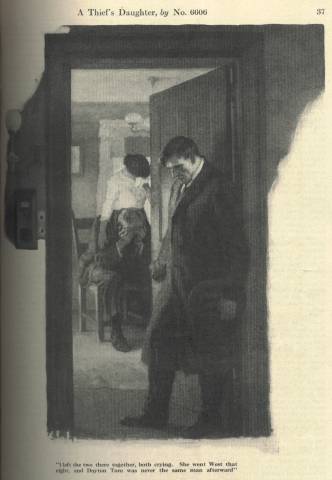I always thought a young Chester Morris was one of the toughest looking S.O.B.’s I’ve seen on film. During the period I’m talking about he starred in three pretty big MGM pictures, The Divorcee (1930) opposite Norma Shearer, the incredible early prison picture The Big House (1930) with Wally Beery, and Red-Headed Woman (1932) with Jean Harlow and the slap:
By that point Chester Morris already had an Oscar nomination behind him, for 1929’s Alibi, and the future looked bright. Morris was born for this career, his father an actor and his mother a comedienne, he’d drop out of school and tour with his family from a young age. He’d debut on stage at age 17, in support of Lionel Barrymore in The Copperhead, and worked for George M. Cohan’s New York company for five years after that. He was signed to a film contract by D.W. Griffth in 1928, but it was United Artists’ Roland West who’d use Morris in his nominated role as a mobster in Alibi.
As an aside, Morris and West must have remained close, because it is said in many places that West made a 1952 deathbed confession to Morris that he had killed his girlfriend, Thelma Todd, in 1935. From what I can gather from the sources on hand this is basically hearsay from Chester Morris, though Michelle Vogel and Liz Nocera write in Hollywood Blondes![]() that Zasu Pitts’ adopted son Don Gallery tells a similar story of West’s confession. But let’s save that for another day and get back to our birthday boy, Chester Morris:
that Zasu Pitts’ adopted son Don Gallery tells a similar story of West’s confession. But let’s save that for another day and get back to our birthday boy, Chester Morris:
Morris spent the 1940’s as Boston Blackie, appearing as the ex-jewel thief turned detective fourteen times for Columbia between 1941 and 1949, beginning with Meet Boston Blackie.
The Boston Blackie stories were by Jack Boyle, and according to Wikipedia “first appeared in the early 20th Century. “The Price of Principle” was a short story in the July, 1914 issue of The American Magazine. Boyle’s character also turned up in Cosmopolitan. In 1917, Redbook published the novelette, “Boston Blackie’s Mary,” and the magazine brought the character back with “The Heart of the Lily” (February, 1921).” I haven’t handled any of those specific magazines, though I’ve had possession of a few issues of The American Magazine, October 1914, that included the story “The Thief’s Daughter” with the bonus of being illustrated by N.C. Wyeth.

NC Wyeth illustration for A Thief's Daughter
As was the way of many an aging star from this period, Morris had a long run as a guest star on television throughout the 1950’s and 60’s, including several popular shows and anthology series. His final film was The Great White Hope (1970). Morris had cancer and died of an overdose of barbiturates on September 11, 1970.
[phpbay]chester morris, 12, 45100, “”[/phpbay]



Leave a Reply